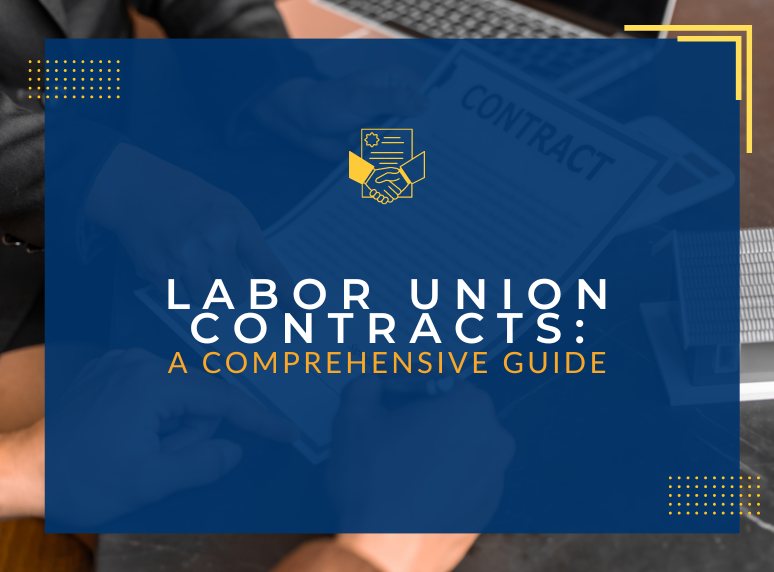A labor union contract is also known as collective bargaining agreement. A bilateral agreement that establishes the terms and conditions of employment for union members. Contract language can vary significantly across industries and workforces but we can still expect to see some common issues addressed in collective bargaining.
This is one of the most important benefits of coming together with your colleagues to form a union is gaining the clarity and security of a union contract. In this article, we will explore many of the most important segments of labor union contracts, including their components, the collective bargaining process, and the importance of good-faith negotiations.
Collective Bargaining and Negotiation Process
The term “collective bargaining” refers to the negotiation of employment terms between an employer and a group of workers. Labor union contracts are the outcome of this negotiation process, which involves two committees representing the union members and management.
Union members are normally represented by their labor union during collective bargaining. The union’s bargaining team is usually selected through a process outlined in the union’s constitution and by-laws, while the employer designates the management team.
In union employee contract negotiations, the parties involved typically include representatives from the labor union, such as the union’s local president, employees within different departments, and/or union steward. On the other side, the employer’s negotiating team may consist of leaders from the human resources department, the company’s president, and a lawyer knowledgeable in labor and employment law.
Key Components of Labor Union Contracts
Labor union contracts include various components that outline agreements on wages, benefits, working schedules, seniority-based bidding for shifts, holiday schedules, and grievance procedures. Early in negotiations, the parties focus on two critical clauses: management’s rights and the deduction of union dues from employees’ paychecks.
Labor union contracts include several key components that outline the rights, obligations, and terms of employment for union members. These components include:
- Wages: The contract specifies the wages or salary structure for different job classifications and may include provisions for regular pay increases or cost-of-living adjustments.
- Benefits: It outlines the comprehensive benefits package offered to union members, which may include health insurance, retirement plans, vacation and sick leave, and other fringe benefits.
- Working Schedules: The contract defines work hours, shift rotations, and any provisions for overtime pay, as well as guidelines for breaks and meal periods.
- Seniority-Based Bidding: It establishes a system for assigning shifts, promotions, or job assignments based on seniority within the union.
- Holiday Schedules: The contract outlines the recognized holidays and any premium pay rates or time-off provisions for working on holidays.
- Grievance Procedures: It establishes a formal process for resolving disputes or grievances between union members and the employer, including steps for filing complaints and the arbitration process if necessary.
- Management Rights: The contract defines the scope of the employer’s authority and outlines the limitations on management’s decision-making power within the unionized workforce.
- Union Dues: It includes provisions on how union dues are collected from employees’ paychecks and remitted to the labor union.
These components serve as the foundation for the working relationship between the labor union and the employer, ensuring clarity and fairness in the terms and conditions of employment.
Tentative Agreement and Ratification Process
When the union and the employer reach a tentative agreement, they create a memorandum of understanding (MOU). This document contains all the elements of the final contract but requires ratification by the union members. After reviewing the MOU, the parties reconvene to address outstanding matters and negotiate final details. Upon reaching a final agreement, the labor union seeks ratification through voting among its members.
- A tentative agreement in the context of labor union contracts refers to a preliminary or initial agreement reached between the labor union and the employer. This agreement outlines the terms and conditions of employment, including provisions related to wages, benefits, working conditions, and other relevant factors. However, it is important to note that a tentative agreement is not yet final or binding.
- After reaching a tentative agreement, the labor union and employer typically draft a document called a Memorandum of Understanding (MOU) or a similar term. The MOU contains all the agreed-upon elements of the contract but requires further steps for it to become a fully ratified and enforceable labor union contract.
- The ratification process is the next stage, wherein the labor union seeks approval from its members regarding the tentative agreement. The union’s bargaining committee presents the details of the agreement to union members and allows them to vote on whether to accept or reject it. The voting process may vary but is typically conducted through a formal ballot or secret ballot.
- If the majority of union members vote in favor of the agreement, the contract is considered ratified. Once ratified, the labor union contract becomes legally binding, and the terms outlined in the agreement are enforceable by both the union and the employer.
The tentative agreement and ratification process ensures that the labor union members have the opportunity to review and approve the negotiated terms before they become legally binding, ensuring democratic decision-making within the union.
Importance of Good Faith Bargaining
The National Labor Relations Act mandates good-faith efforts from both the union and the employer during the bargaining process. Good faith bargaining entails scheduling convenient sessions, preparedness for negotiations, and refraining from intimidating behaviors. Actions such as stonewalling and unreasonable demands are considered bad faith and violate the act. The National Labor Relations Board intervenes when either party fails to bargain in good faith.
The importance of the good faith bargaining during the collective bargaining process is an essential part of the negotiation between labor unions and employers. Here are the key reasons why:
- Promotes Fairness and Balance: Good faith bargaining fosters a fair and balanced negotiation process, where both parties actively engage in meaningful discussions and make sincere efforts to reach mutually acceptable agreements. It ensures that neither the union nor the employer holds an unfair advantage or exploits the bargaining process.
- Enhances Trust and Collaboration: Acting in good faith builds trust and facilitates a collaborative atmosphere during negotiations. When both the union and the employer approach bargaining with openness, honesty, and a willingness to find common ground, it paves the way for constructive dialogue and the exploration of creative solutions.
- Encourages Efficient Negotiations: Bargaining in good faith helps streamline the negotiation process, as both parties come prepared with relevant information and are committed to reaching timely resolutions. This reduces unnecessary delays, promotes efficiency, and minimizes disruptions to work and productivity.
- Preserves Labor-Management Relationships: By engaging in good faith bargaining, labor unions and employers can maintain positive relationships even during challenging negotiations. It demonstrates respect for each other’s interests and concerns, which can help preserve long-term working relationships and prevent unnecessary conflicts or animosity.
- Complies with Legal Requirements: Good faith bargaining is often a legal obligation enforced by labor laws and regulations. In many jurisdictions, labor relations statutes mandate that both parties negotiate in good faith, prohibiting bad-faith actions such as making unreasonable demands, stonewalling, or engaging in coercive tactics. Compliance with these legal requirements is crucial to avoid potential legal consequences or sanctions.
- Facilitates Sustainable Agreements: Bargaining in good faith increases the likelihood of reaching durable and sustainable labor union contracts. When both parties genuinely consider each other’s perspectives and interests, the resulting agreements tend to be more comprehensive, mutually beneficial, and capable of fostering long-term stability and cooperation.
Good faith bargaining is essential for promoting fairness, trust, collaboration, efficiency, and legal compliance in labor union contract negotiations. It sets the foundation for constructive and successful labor-management relationships, benefiting both union members and employers alike.
Conclusion
Labor union contracts play a vital role in establishing the rights and responsibilities of both union members and employers. Through collective bargaining and good faith negotiations, these contracts ensure fair working conditions and address grievances.
Understanding the components and processes involved in labor union contracts is crucial for both parties involved in the employment relationship.

